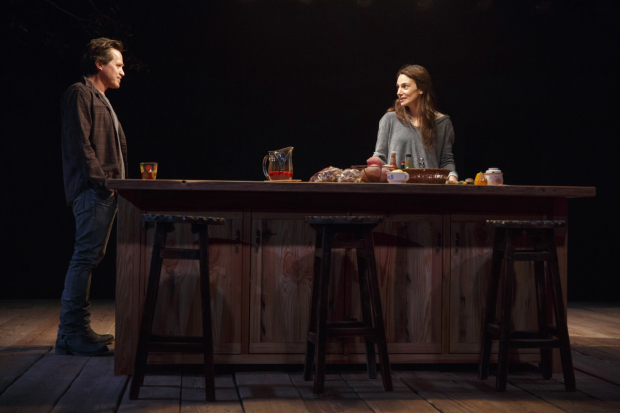Antlia Pneumatica
Anne Washburn’s celestial play makes its world premiere at Playwrights Horizons.

(© Joan Marcus)
Anne Washburn leads with a hard-to-pronounce Latin title for her latest Playwrights Horizons commission, now running in the company's intimate Peter Jay Sharp Theater. It's a wall of intimidation that greets you right at the door, and after watching (and often listening to) Antlia Pneumatica — a play that not only takes its name from a constellation, but is also about the cosmic or thoroughly uncosmic relationships life throws us into — this feeling of isolation is not quick to subside.
The story follows a group of out-of-touch friends who have gathered at a ranch in Texas Hill Country for the funeral of one of their estranged comrades. Details are vague, but we gather that the ranch was a childhood summer home for Nina (a poised Annie Parisse) and her sister Liz (a superbly sardonic April Matthis). Sean, the deceased, left behind only an out-of-date "When I Die" file, as opposed to a legitimate will, and named the sisters’ country homestead (their old gathering place) as the location he wanted to be buried. In all likelihood, that desire no longer held true at the time of his premature passing (the file was made during the group's friendship heyday), but it lands his old pals with a box of his ashes and an unanticipated reunion.
Instead of your tearful funeral trope, Washburn offers an arguably more realistic depiction, as a bunch of old friends try to parse their feelings — both for one another and for Sean, whose death has inspired distressingly little distress. Only Nina — a woman vigorously attached to facts and rules — tries to make the event a poignant, ritualistic one. She searches for the perfect urn for Sean's remains and diligently cooks a funereal feast alongside her friend Ula (a wry Maria Striar), a begrudging Liz, and Len (a delightfully aloof Nat DeWolf), who has jarring revelations about his own imminent death.
The group engages in detached conversation, suited for people who are not quite friends, yet not quite strangers. It leaves us wondering whether there actually is anything still tethering these friends to one another, or if they merely carry affections for the shadows of who they all used to be. Adrian, a bad boy from Nina's past (played by Rob Campbell with his usual aplomb for the mysterious) is the most elusive of these shadows — unexpectedly showing up at the ranch after no contact with Nina for 14 years.
This sense of distance may not satisfy our empathic cravings as theatergoers, but director Ken Rus Schmoll and his creative team appropriately build it into the dreamlike version of reality they conjure onstage. Sound designer Leah Gelpe takes on much of the responsibility for fleshing out this surreal atmosphere with bucolic noises filling the air. Full scenes are even piped in through speakers while the audience stares at a dark stage (the part of Nina's daughter Casey, played by Skylar Dunn, is entirely prerecorded), though the effect unfortunately only diminishes the immediacy of the performance .
Washburn does a fine job posing intriguing questions about the nature of relationships. But the play feels more like a series of intellectual musings than a fully immersive world. The majority of Antlia Pneumatica takes place around a kitchen counter (the centerpiece of Rachel Hauck's sparse, rustic set) where the friends make their way through topics including mortality and the significance of time. The most enveloping moment is a starry scene between Nina and Adrian (beautifully realized by lighting designer Tyler Micoleau) where the two recount their history. Parisse and Campbell are captivating as they summon the past. But even here, Washburn has Adrian heavy-handedly explain the title "Antlia Pneumatica" (a dim constellation vaguely shaped like an air pump ), and with it, the play's overall thesis.
The scene draws poetic parallels between the faint collection of stars and these friends' impromptu gathering (and suggests why the pals rarely alter their formation around the kitchen counter), but we need more than just an eloquent metaphor to keep us attached to this story. We never learn much about any of these people — who they are now or who they used to be. And the more they seem to disconnect from one another, the more we disconnect from them.
Surprisingly, the character we end up with the strongest emotions for is Nina's unseen daughter Casey, whom we hear have her first experience with death via a crushed ant. For those looking for the epic theatricality Washburn displayed in her last Playwrights Horizons contribution, Mr. Burns, a Post-Electric Play, Antlia Pneumatica may be disappointingly subdued. But as a flood of light ushers in a grand requiem for the aforementioned deceased ant, the playwright's hazy star comes into focus.








